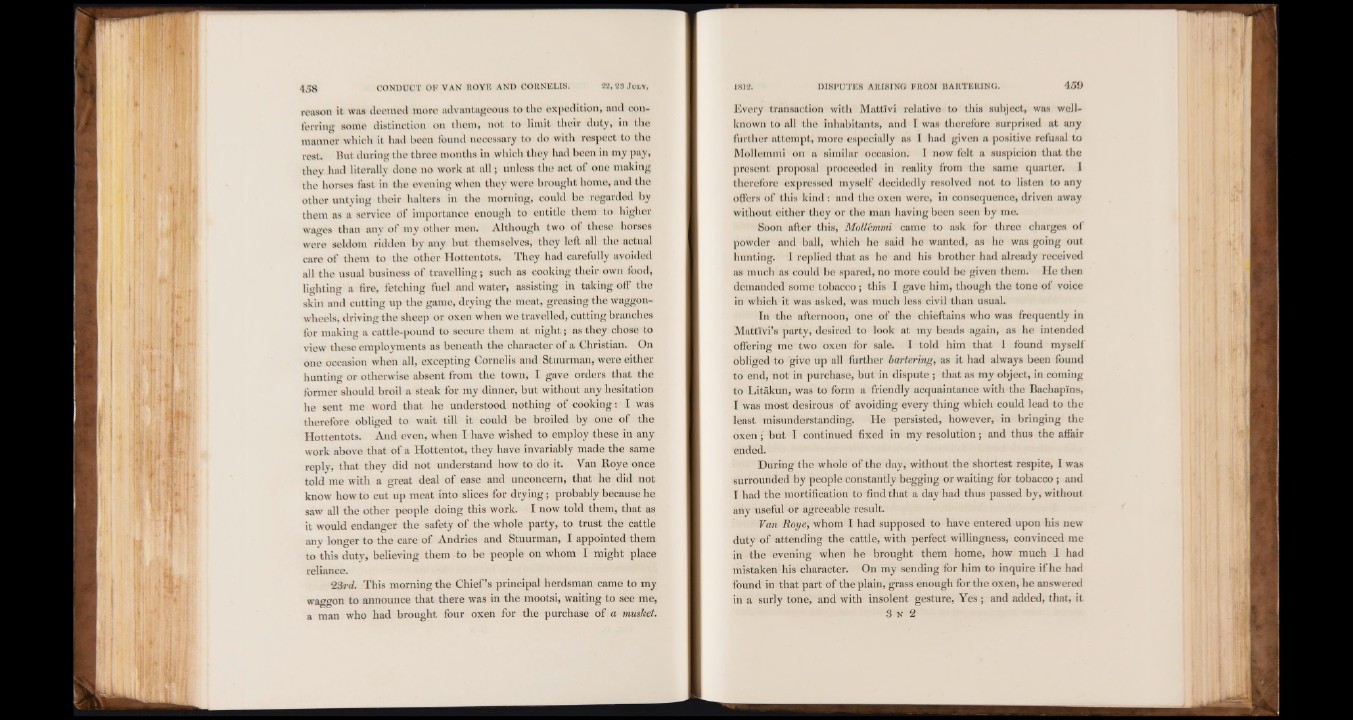
reason it was deemed more advantageous to the expedition* and conferring
some distinction on them, not to limit their duty, in the
maimer which it had been t'ound necessary to do with respect to the
rest. But during the three months in which they had been in my pay,
they had literally done no work at all j unless the act of one making
the horses fast in the evening when they were brought home, and the
other untying their halters in the morning, could be regarded by
them as a service of importance enough to entitle them to higher
wages than any of my other men. Although two of these horses
were seldom ridden by any but themselves, they left all the actual
care of them to the other Hottentots. They had carefully avoided
all the usual business of travelling j such as cooking their own food,
lighting a fire, fetching fuel and water, assisting in taking off the
skin and cutting up the game, drying the meat, greasing the waggon-
wlieels, driving the sheep or oxen when we travelled, cutting branches
for making a cattle-pound to secure them at night j as they chose to
view these employments as beneath the character of a Christian. On
one occasion when all, excepting Cornells and Stuurman, were either
hunting or otherwise absent from the town, I gave orders that the
former should broil a steak for my dinner, but without any hesitation
he sent me word that he understood nothing of cooking: I was
therefore obliged to wait till it could be broiled by one of the
Hottentots. And even, when I have wished to employ these in any
work above that of a Hottentot, they have invariably made the same
reply, that they did not understand how to do it. Van Roye once
told me with a great deal of ease and unconcern, that he did not
know how to cut up meat into slices for drying; probably because he
saw all the other people doing this work. I now told them, that as
it would endanger the safety of the whole party, to trust the cattle
any longer to the care of Andries and Stuurman, I appointed them
to this duty, believing them to be people on whom I might place
reliance.
23rd. This morning the Chief’s principal herdsman came to my
waggon to announce that there was in the mootsi, waiting to see me,
a man who had brought four oxen for the purchase of a musket.
Every transaction with Mattlvi relative to this subject, was well-
known to all the inhabitants, and I was therefore surprised at any
further attempt, more especially as I had given a positive refusal to
Mollemmi on a similar occasion. I now felt a suspicion that the
present proposal proceeded in reality from the same quarter. I
therefore expressed myself decidedly resolved not to listen to any
offers of this kind: and the oxen were, in consequence, driven away
without either they or the man having been seen by me.
Soon after this, Moll'emmi came to ask for three charges of
powder and ball, which he said he wanted, as he was going out
hunting. I replied that as he and his brother had already received
as much as could be spared, no more could be given them. He then
demanded some tobacco; this I gave him, though the tone of voice
in which it was asked, was much less civil than usual.
In the afternoon, one of the chieftains who was frequently in
Mattlvi’s party, desired to look at my beads again, as he intended
offering me two oxen for sale. I told him that I found myself
obliged to give up all further bartering, as it had always been found
to end, not in purchase, but in dispute ; that as my object, in coming
to Litakun, was to form a friendly acquaintance with the Bachapins,
I was most desirous of avoiding every thing which could lead to the
least misunderstanding. He persisted, however, in bringing the
oxen; but I continued fixed in my resolution; and thus the affair
ended.D
uring the whole of the day, without the shortest respite, I was
surrounded by people constantly begging or waiting for tobacco; and
I had the mortification to find that a day had thus passed by, without
any useful or agreeable result.
Van Roye, whom I had supposed to have entered upon his new
duty of attending the cattle, with perfect willingness, convinced me
in the evening when he brought them home, how much I had
mistaken his character. On my sending for him to inquire if he had
found in that part of the plain, grass enough for the oxen, he answered
in a surly tone, and with insolent gesture, Yes ; and added, that, it
3 n 2